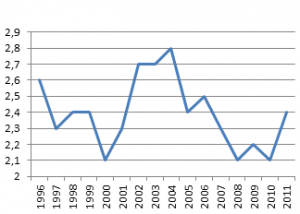From 2008 to 2012, former Russian President Medvedev had been pursuing a wide-ranging modernization agenda. At the time, this initiative was widely discussed. Was it just an advertising slogan or a real political course? Is it theoretically possible to pursue modernization policy in Russia? A number of researches were carried out to assess public opinion on this newly declared policy. For instance, according to a survey conducted by SuperJob’s Research Center in 2010, only 13 percent of Russians believe that since Medvedev published the programmatic article “Forward, Russia!” proclaiming a new modernization course, the country has undergone a real change, while 61 percent of respondents have not noticed any changes or see the modernization agenda as empty words, and 26 percent were undecided.
Modernization is above all about real changes. Do the majority of Russians need real changes today? They probably do not. The overwhelming corruption that is rightfully considered one of the pillars of the current Russian regime represents one of today’s most topical issues. Today, corruption essentially suits everybody, including government officials, the regime in general and the majority of the Russian population.
In 2009, Presidents Barack Obama and Dmitry Medvedev established a U.S.– Russia Bilateral Presidential Commission. The Commission consisted of 20 working groups covering different areas of the U.S.-Russian cooperation on joint corruption monitoring in Russia and the use of U.S. experiences in combating it. President Obama’s chief adviser on Russia and later U.S. Ambassador to Russia Michael McFaul and deputy Kremlin chief-of-staff Vladislav Surkov became the first two co-chairs of the Civil Society Working Group commonly referred to as the McFaul-Surkov commission.

Since 2010, the dynamics of corruption level in Russia have been the following: in 2011, Russia was ranked 143rd, in 2012, 133rd, in 2013, 127th. Although according to TI, the situation in Russia has been slowly improving, it is obvious that Russia is still stuck at the bottom. The situation with corruption in Russia has not improved significantly especially among high-powered people close to the Kremlin, which radically undermines both the prospects of economic growth and investment attractiveness of the country and public trust in the seriousness of the government’s commitment to fight corruption. In 2013, having apparently lost faith in success, the United States unilaterally withdrew from the working groups of the commission. It is worth noting that Vladislav Surkov was then appointed deputy prime minister for economic modernization.
Unfortunately, today, there is no accurate data concerning either Russia’s level of modernization or its comparative ratings. According to some specialists, “Russia is the country of the never-ending modernization like a person who is constantly receiving medical treatment but never really gets well.” A number of measures are being proposed with a view of changing the situation including dismantling mechanisms and institutions of financing the economy from state funds, transforming the fiscal system, and promoting private business (as opposed to business closely connected to the state).
It is however obvious that any measures aimed at changing the situation and sending the modernization process in the right direction will immediately affect contacts and relations based on corruption. Consequently, the entire state machine will try to prevent such changes from taking place.
According to Russian Economic Development Minister Alexei Ulyukayev, production costs in Russia including transaction costs are the same as in developed countries whereas Russian institutions are similar to those in developing economies. He thinks it is necessary to invest the entire National Welfare Fund into infrastructure and other investment projects and notes that developed countries do not establish savings funds. In developed countries, he argues, the accumulation of national assets is achieved in the form of private capital or through direct expenditure of budgetary funds for investment purposes, and consequently the accumulation of taxpayers’ money in any savings funds means a direct withholding of these resources from current national consumption and investments.
All one needs to do is to figure out who will control financial flows from state funds into the real sector of the economy, and how. Given the current level of corruption in Russia, funds can be stolen, siphoned off, extorted or moved abroad along the way.
Therefore, the key question both for business and for the entire Russian population consists in choosing between modernization and corruption, which is a hard choice for many people. The main thing is to avoid the “modernization of corruption…”
Andrey Stolbunov, Oct 7, 2014






